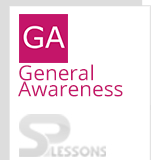 Introduction
Introduction
General Awareness is an important component of most of the competitive exams for employment in the government sector in India. The article RRB NTPC General Awareness Quiz 3 presents questions related to IBPS PO, SSC CGL, SSC MTS, SSC CHSL, SEBI Grade A, Indian Bank PGDBF PO, LIC HFL, NIACL Assistant, RRB Assistant, RRB PO, SBI Clerk, SBI PO, RBI Grade B and BOB PGDBF PO. The article RRB NTPC General Awareness Quiz 3 have been designed keeping in view the significant role of General Awareness sections in the scoring of competitive exams. RRB NTPC General Awareness Quiz 3 is very useful to crack the General Awareness sections of several competitive exams.
 Pattern
Pattern
RRB NTPC General Awareness Quiz 3 - Exam Pattern
The RRB NTPC General Awareness section in the First Stage CBT, has the 40 objective questions. Below mentioned are the different categories of expected questions in the First Stage CBT of RRB NTPC General Awareness Section.
| Exam Duration in Minutes | No. of Questions (each of 1 mark) from | Total No. of Questions | ||
|---|---|---|---|---|
| General Awareness | Mathematics | General Intelligence and Reasoning | ||
| 90 | 40 | 30 | 30 | 100 |
 Syllabus
Syllabus
[Click Here] for RRB NTPC First Stage CBT Syllabus
Note:
Negative Marking: There will be negative marking and 1/3 mark shall be deducted for each wrong answer.
 Quiz
Quiz
1. Who has the power to dismiss the Council of Ministers of a State?
-
A. President
B. Governor
C. Legislative Assembly
D. Legislative Council
-
A. 18 years
B. 25 years
C. 30 years
D. 35 years
-
A. All India Services
B. Declaration of Emergency
C. Hindi Language
D. Center State Relationships
-
A. President
B. Prime Minister
C. Parliament
D. Council of Ministers
-
A. Mount Abu
B. Hyderabad
C. Nagpur
D. Mussoorie
1. Who among the following can participate in the proceedings of the Lok Sabha but cannot vote?
-
A. Solicitor General
B. Attorney General
C. Advocate General
D. Speaker of the Lok Sabha
-
A. Erstwhile USSR
B. USA
C. Ireland
D. UK
-
A. 6 March 1950
B. 15 August 1947
C. 15 March 1950
D. 6 August 1952
-
A. 24th
B. 42nd
C. 44th
D. Never amended
-
A. Chakravarty Committee
B. Malegam Committee
C. Rangarajan Committee
D. Ashok Mehta Committee
1. Who represents the State Government at Panchayat level?
-
A. Gram Sevak
B. Mukhiya
C. Sarpanch
D. Panchayat Samiti
-
A. Speaker of the Lok Sabha
B. Parliament
C. Supreme Court
D. Parliament
-
A. Indira Gandhi
B. Benazir Bhutto
C. Margaret Thatcher
D. Sirimavo Bandaranaike
-
A. All members are for the life time.
B. It cannot be dissolved.
C. It is in session for entire year.
D. None of these
-
A. Only a socialist State.
B. State having Presidential Administrative System
C. State having Parliamentary Administrative System
D. State whether Head of the State is not hereditary.



